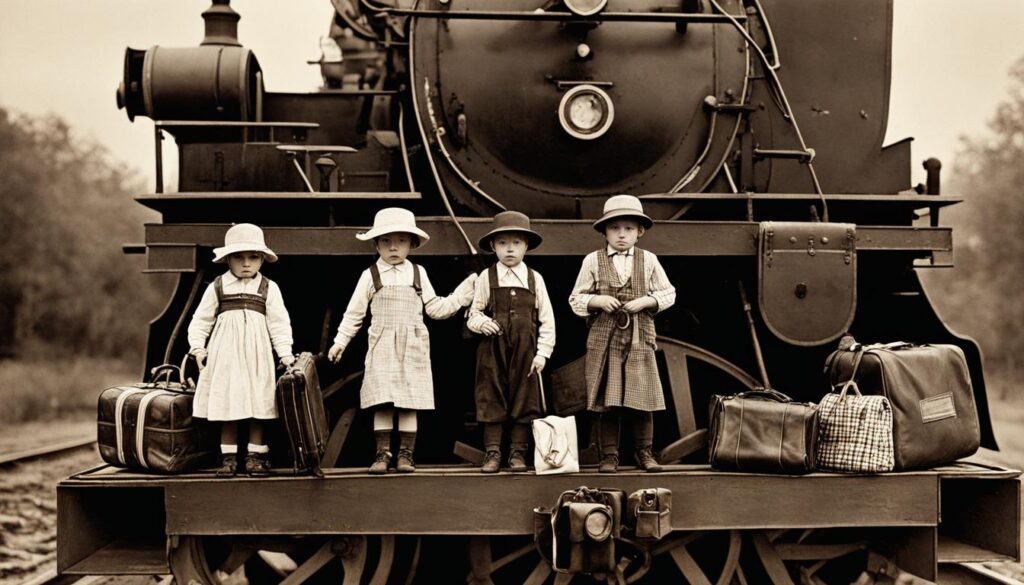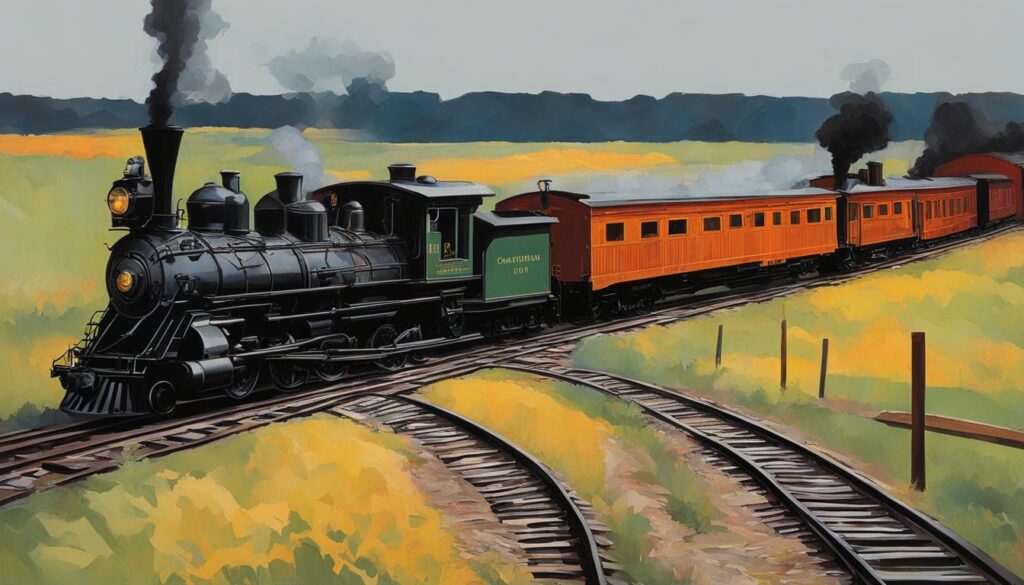Welcome to our audiobook review of “Orphan Train” by Christina Baker Kline. In this article, we provide a comprehensive analysis of Kline’s historical fiction novel, exploring its plot, themes, and characters. The story follows the journey of two women, Vivian and Molly, whose paths cross as they confront their pasts and discover the power of resilience and human connection.
“Orphan Train” has garnered critical acclaim and has captivated readers since its release. Its exploration of the orphan train movement, a real-life phenomenon in the 19th and early 20th centuries, adds depth and historical context to the narrative. We will also evaluate the audiobook version of “Orphan Train”, examining its production quality and listening experience.
Join us as we take a closer look at “Orphan Train” and examine why it has resonated with so many readers worldwide.
Plot Summary
Orphan Train is a historical fiction novel by Christina Baker Kline. The book follows the stories of two women: Vivian, an elderly woman who was one of the orphan train riders during the Great Depression, and Molly, a seventeen-year-old foster child navigating the foster care system in present-day Maine.
The novel explores themes of loss, identity, and the resilience of the human spirit. As Vivian recounts her experiences, readers witness the struggles and triumphs of orphan train riders and gain insight into this little-known aspect of American history.
As the story progresses, Molly and Vivian’s lives become intertwined, and they develop a deep connection that helps them both heal from their past traumas. Throughout the book, readers are taken on a powerful journey of self-discovery and the importance of human connection, as Molly and Vivian navigate their respective challenges with courage and determination.
Disclaimer: This image is used for visual purposes only and does not represent any specific character or scene in the book.
Author Background
Christina Baker Kline, the author of “Orphan Train,” is an accomplished novelist and non-fiction writer. With several best-selling books to her name, Kline has established herself as a prominent figure in contemporary American literature.
Kline’s writing style is characterized by vivid descriptive language and a keen eye for detail. Her prose is emotionally resonant, with a deep focus on themes such as loss, identity, and the human experience.
Some of Kline’s previous works include “Bird in Hand,” “The Way Life Should Be,” and “Sweet Water.” These books have received critical acclaim for their powerful storytelling and insightful exploration of the human condition.
“Kline’s ability to convey the complexities of human relationships and emotions through her writing is truly remarkable.”
Throughout her career, Kline has been recognized for her contributions to literature. She has received numerous awards and honors, including the New England Book Award, the Maine Literary Award, and the Reader’s Choice Award from the Salt Lake County Library.
“Kline’s books are a testament to her talent as a writer and her ability to create characters that stay with readers long after the final page.”
Overall, Kline’s literary background and accomplishments as an author speak to the high level of quality and skill readers can expect from “Orphan Train.”
Audiobook Performance
The audiobook version of “Orphan Train” is a masterful rendition in terms of performance, which captures the essence of the novel. The narrator’s voice is clear and articulate, delivering an immersive listening experience throughout the book. The production quality is high, with excellent sound effects and music, creating a vivid portrayal of events and emotions.
The voice acting is remarkable, bringing each character to life with distinctive voices that are consistent throughout the narration. The narrator’s performance captures the nuances of each character’s dialogue and emotions perfectly.
In conclusion, the audiobook performance of “Orphan Train” is exceptional, elevating the overall listening experience and immersing the listener into the world of the book.
Themes and Messages
Christina Baker Kline’s “Orphan Train” explores several central themes and messages that resonate with readers. One of the most prominent themes in the book is the power of resilience. The story follows two main characters, Vivian and Molly, who have both experienced significant hardships and difficulties in their lives. Through their journeys, Kline emphasizes the importance of persevering in the face of adversity.
Another central theme in “Orphan Train” is the significance of hope. The book highlights the ways in which hope can heal wounds and provide comfort, even in the bleakest of circumstances. Kline shows how hope can be found in unexpected places and people, emphasizing the idea that there is always a glimmer of light in the darkness.
The importance of human connection is also a major message in “Orphan Train.” The book explores how relationships, both positive and negative, can shape a person’s life and influence their actions. Kline suggests that even the briefest interactions with others can have a lasting impact, underscoring the significance of treating others with kindness and empathy.

Overall, “Orphan Train” is a poignant and moving book that offers readers insight into the complexities of the human experience. Through the exploration of these themes and messages, Kline invites readers to reflect on their own lives and the ways in which they can find resilience, hope, and connection amidst the challenges of the world.
Character Analysis
“Orphan Train” presents an array of complex characters that contribute to the book’s rich, emotional narrative. Christina Baker Kline masterfully crafts characters that are relatable, nuanced, and engaging. Throughout the story, readers witness characters undergo significant transformations, grappling with their pasts, and navigating their present circumstances.
The two main characters are Molly Ayer, a teenage girl struggling with her identity and Vivian Daly, a woman who rode an orphan train as a child. Molly and Vivian’s relationship evolves throughout the book, and Kline uses their experiences to explore the themes of resilience and human connection.
Molly is a character that readers can empathize with, as she struggles with being disconnected from her family and desperate for a sense of belonging. Vivian, on the other hand, is a character that readers can admire for her strength and resilience, as she endures so much throughout her life. Their stories intertwine, and their relationship is the backbone of the book.
Kline’s character analysis is layered and nuanced, examining not just the individual characteristics of each character but also the relationships between them. The author’s use of descriptive language creates memorable characters that resonate with readers long after finishing the book. Through character analysis, readers gain a deeper understanding of the messages and themes that Kline aims to convey in “Orphan Train.”
Writing Style and Language
Christina Baker Kline’s writing style in Orphan Train is notable for its evocative descriptions and masterful storytelling. Kline imbues her prose with vivid imagery and sensory details, providing readers with a richly immersive experience. Her language is precise and concise, allowing the plot and characters to take center stage.
“There was something restorative about the ocean, the slosh and churn of the sea, the rhythmic crash of waves on the rocks, the tangy salt air. It was a tonic as powerful as any drug or tonic for a lonely, beleaguered soul.”
Kline’s use of metaphor and symbolism adds depth to the narrative, with themes of journeys, loss, and resilience woven throughout the story. The author’s historical research is also evident in her writing, as she seamlessly integrates real-life events and details into the novel.
Overall, Kline’s writing style and language choices in Orphan Train make for a captivating and engaging read. Her attention to detail and skillful storytelling combine to create a true literary masterpiece.
Historical Context
To truly understand “Orphan Train,” we must first explore the historical context surrounding the events depicted in the book. From 1854 to 1929, an estimated 200,000 orphaned, abandoned, and homeless children were placed on trains, known as “orphan trains,” and sent from cities in the East Coast to families in rural areas of the Midwest and West.
The idea behind the orphan trains was to provide these children with a chance at a new life, away from the poverty, disease, and crime of the crowded urban areas. The children were supposed to be placed with families who would provide them with food, shelter, and an education, but the reality was often far from ideal. Many children were subjected to abuse, neglect, and exploitation by their new “families,” while others struggled to adapt to their new surroundings and often felt like outsiders in their new communities.
“Orphan Train” is a work of fiction, but it is deeply rooted in the history of the orphan trains and their impact on the lives of the children who rode them. By delving into the real-life experiences of the orphan train riders, author Christina Baker Kline brings a sense of authenticity and historical context to her story, shedding light on a little-known chapter of American history.
Critical Reception
The reception of “Orphan Train” has been overwhelmingly positive, with many critics praising the historical depth and emotional resonance of the story. According to Goodreads, the book has an average rating of 4 out of 5 stars based on over 300,000 ratings.
Booklist describes the book as “inauspicious, engrossing, and moving,” while Publishers Weekly calls it a “well-crafted and absorbing novel.” The New York Times Book Review notes that the book “illuminates a fascinating and overlooked chapter of America’s past.”

Overall, the critical reception of “Orphan Train” has been overwhelmingly positive, with many reviewers citing the book’s powerful storytelling and poignant exploration of friendship, loss, and resilience.
Comparison to Other Works
While “Orphan Train” shares similarities with other works in the historical fiction genre, it stands out due to its unique portrayal of the less-explored theme of orphan trains.
The book’s emphasis on the importance of human connection and the impact of traumatic experiences on individuals’ lives can be juxtaposed with similar themes in The Nightingale by Kristin Hannah and The Kitchen House by Kathleen Grissom.
However, whereas The Nightingale explores the struggles of two sisters during World War II and The Kitchen House depicts the life of a young Irish girl sold into slavery in the 18th century, “Orphan Train” reveals the experiences of orphan train riders in the early 20th century.
“Christina Baker Kline’s Orphan Train has a heart as big as the Atlantic sky it opens beneath. Taken in by a splendid cast of characters, this novel of loss and salvation manages to be both panoramic and intimate. You won’t soon forget these people or their orphan train ride.”
Ultimately, “Orphan Train” stands out as a valuable addition to the historical fiction genre that provides a unique insight into the lives of orphan train riders.
Reader Feedback
Readers have expressed their thoughts and feelings about “Orphan Train,” and we’ve gathered some quotes and excerpts to share:
“I loved this book. The history aspect really pulled me in, and the characters were complex and interesting.” – Sarah T.
“The audiobook version of ‘Orphan Train’ was beautifully produced. The narration was expertly done, and I was completely transported into the story.” – Michael R.
Many readers praised Christina Baker Kline’s writing and storytelling skills:
“Kline’s writing is descriptive and emotive, without being overly sentimental. She has a gift for drawing the reader into the story.” – Rachel H.
Overall, readers found “Orphan Train” to be a powerful and moving read:
“This book stayed with me long after I finished it. It’s a moving exploration of human resilience and the importance of human connection.” – Julia L.
Recommendation
After a thorough analysis of “Orphan Train,” we highly recommend this audiobook to fans of historical fiction with a heart-warming touch. The book’s exploration of resilience, hope, and the importance of human connection creates a captivating listening experience.
If you enjoy novels that incorporate real-life historical events, this book is a must-read. Additionally, if you appreciate complex character development and emotional depth, “Orphan Train” is sure to leave a lasting impact.
Overall, we recommend “Orphan Train” to anyone seeking a meaningful and uplifting audiobook. We believe it will be particularly appealing to fans of Kristin Hannah’s “The Nightingale” or Anthony Doerr’s “All the Light We Cannot See.”
Conclusion
Overall, “Orphan Train” by Christina Baker Kline is a heartwarming and thought-provoking audiobook that offers a glimpse into a lesser-known piece of American history. The audiobook performance is excellent, with skilled narration and voice acting that add depth to the characters and story.
The book explores powerful themes such as resilience, hope, and the importance of human connections, making it a must-read for anyone who enjoys historical novels with emotional depth. Christina Baker Kline’s writing style and language choices are engaging and descriptive, creating a vivid portrayal of the characters and their experiences.
The historical context surrounding the events depicted in the book adds an extra layer of depth to the story, making it especially appealing to readers interested in American history. The critical reception of “Orphan Train” has been largely positive, with many praising the book’s emotional impact and historical accuracy.
Overall, we highly recommend “Orphan Train” to anyone who enjoys historical fiction and is looking for an emotionally resonant and thought-provoking read. This audiobook is a great choice for long car rides or lazy afternoons, as it will keep listeners engaged and entertained from start to finish.



